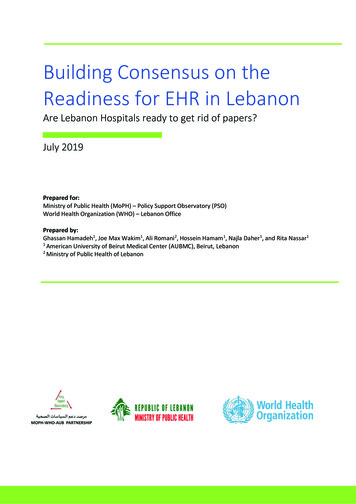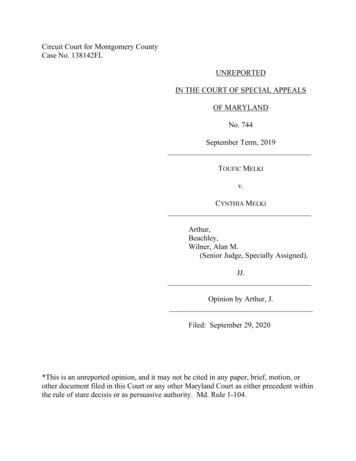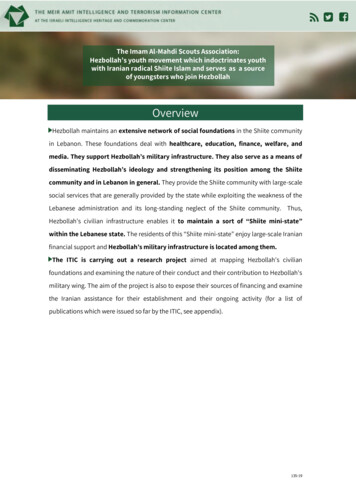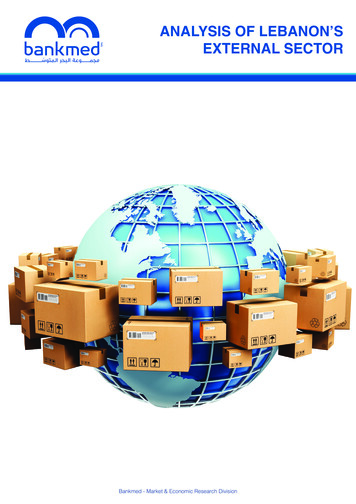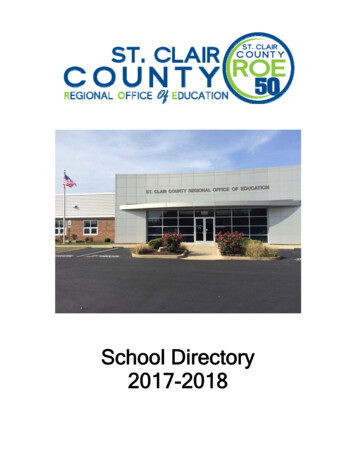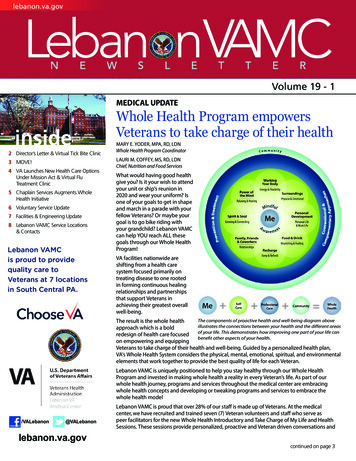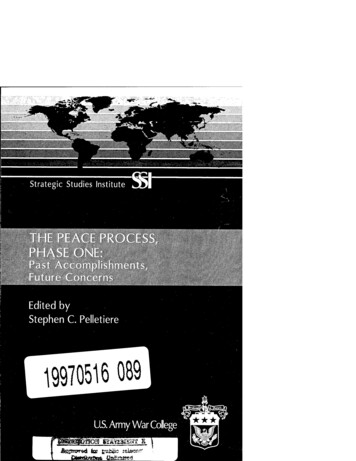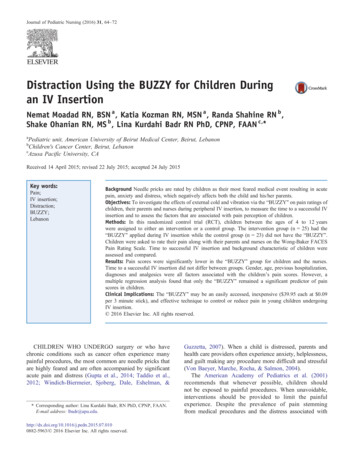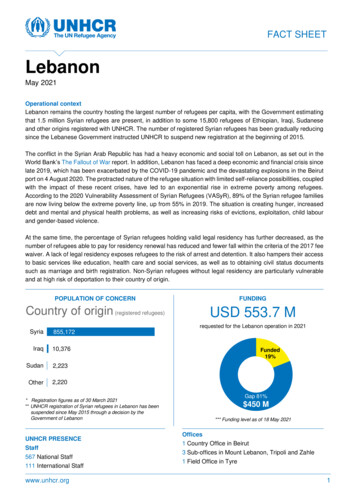
Transcription
FACT SHEETLebanonMay 2021Operational contextLebanon remains the country hosting the largest number of refugees per capita, with the Government estimatingthat 1.5 million Syrian refugees are present, in addition to some 15,800 refugees of Ethiopian, Iraqi, Sudaneseand other origins registered with UNHCR. The number of registered Syrian refugees has been gradually reducingsince the Lebanese Government instructed UNHCR to suspend new registration at the beginning of 2015.The conflict in the Syrian Arab Republic has had a heavy economic and social toll on Lebanon, as set out in theWorld Bank’s The Fallout of War report. In addition, Lebanon has faced a deep economic and financial crisis sincelate 2019, which has been exacerbated by the COVID-19 pandemic and the devastating explosions in the Beirutport on 4 August 2020. The protracted nature of the refugee situation with limited self-reliance possibilities, coupledwith the impact of these recent crises, have led to an exponential rise in extreme poverty among refugees.According to the 2020 Vulnerability Assessment of Syrian Refugees (VASyR), 89% of the Syrian refugee familiesare now living below the extreme poverty line, up from 55% in 2019. The situation is creating hunger, increaseddebt and mental and physical health problems, as well as increasing risks of evictions, exploitation, child labourand gender-based violence.At the same time, the percentage of Syrian refugees holding valid legal residency has further decreased, as thenumber of refugees able to pay for residency renewal has reduced and fewer fall within the criteria of the 2017 feewaiver. A lack of legal residency exposes refugees to the risk of arrest and detention. It also hampers their accessto basic services like education, health care and social services, as well as to obtaining civil status documentssuch as marriage and birth registration. Non-Syrian refugees without legal residency are particularly vulnerableand at high risk of deportation to their country of origin.POPULATION OF CONCERNFUNDINGCountry of origin (registered refugees)USD 553.7 Mrequested for the Lebanon operation in ed19%Gap 81%* Registration figures as of 30 March 2021** UNHCR registration of Syrian refugees in Lebanon has beensuspended since May 2015 through a decision by theGovernment of LebanonUNHCR PRESENCEStaff567 National Staff111 International Staffwww.unhcr.org 450 M*** Funding level as of 18 May 2021Offices1 Country Office in Beirut3 Sub-offices in Mount Lebanon, Tripoli and Zahle1 Field Office in Tyre1
FACT SHEET Lebanon / May 2021Working in PartnershipThe Lebanon Crisis Response Plan (LCRP) 2017-2020, developed by the Lebanese Government andhumanitarian and development partners, provides an integrated humanitarian and stabilization framework,ensuring protection and immediate assistance to the most vulnerable while strengthening and supporting thecapacity of national and local systems to deliver basic services to Lebanese and the refugee population. In2021, UNHCR has project partnership agreements with 27 partners, of which 11 are international, 13 nationaland 3 UN agencies. In December 2020, the LCRP was formally extended for one year, until end of 2021.UNHCR coordinates the implementation of the LCRP jointly with the Ministry of Social Affairs (MoSA) andUNDP, maintaining leadership on the refugee component in line with the Refugee Coordination Model. UNHCRco-leads the Protection, Basic Assistance, Health, Shelter, and Social Stability sectors, and provides supportto other sectors, including Education and WASH, ensuring that refugees are central to planning, strategy designand prioritization. UNHCR is also engaged in the National COVID-19 Response through programmes to supportthe prevention, containment and treatment of cases. In extension of UNHCR’s sector co-leadership andprogrammes in the protection and shelter response to the Beirut port explosions, UNHCR also co-leads theHousing and the Social Cohesion, Inclusion and Gender sectors in the Reform, Recovery and ReconstructionFramework (3RF).ObjectivesThe overall goal of UNHCR in Lebanon is to preserve a dignified protection space for the refugees, whileworking to enable their attainment of durable solutions outside the country. This is broken down into four mainobjectives: Access to Protection: Ensure access to protection, temporary legal residency, and birth and civil statusdocumentation for refugees, and their protection from refoulement. Dignity in Exile: Ensure inclusive access to social protection and a safety net to preserve the dignity andwell-being of refugees in Lebanon, while supporting refugees’ ability to develop their human capital. Secure Continued Hospitality: Preserve the hospitality of Lebanese communities and overall socialstability. Realize Solutions: Facilitate refugees’ attainment of durable solutions in the form of resettlement orcomplementary pathways to third countries and capacitate refugees to exercise their right to voluntaryrepatriation in safety and dignity.While UNHCR’s priority lies in addressing the immediate protection and assistance needs of the refugees, therights-based and solutions mandate makes it imperative to do this in a way that supports refugees’ ability tobuild their human capital, resilience and transferable skills while in exile. In line with the Global Compact onRefugees, the 2030 Agenda for Sustainable Development goal to leave no one behind and the localisationapproach set out in the Grand Bargain, and within the framework of the LCRP’s development component, partof the strategy is to identify opportunities to strengthen the protection of the refugees in Lebanon throughsupporting the development of national legal frameworks and institutions to provide documentation and delivereffective services for Lebanese, refugees and stateless persons. Support to national systems is also importantto mitigate the impact of having such a large refugee population accessing public schools, health and socialservices and local infrastructures, and thereby prevent tensions from rising due to competition for services andresources.www.unhcr.org2
FACT SHEET Lebanon / May 2021Main ActivitiesProtectionAdvocacy aimed at preserving the protection and dignity of refugees while they remain in exile in Lebanon andensuring respect for the principles of non-refoulement and voluntary, safe and dignified returns is at the core ofUNHCR’s work. It is grounded in international standards, principles and good practices, including those set outin the Global Compact on Refugees, and frequently center around respect for the rule of law and due process.UNHCR regularly verifies and updates the data of Syrian refugees who registered with UNHCR before theGovernment’s instruction in 2015 to suspend registration, and registers and determines the claims of asylumseekers of other nationalities. Syrians approaching UNHCR since 2015 are counselled on the suspension ofregistration, have their needs assessed, and are referred to relevant protection and assistance programmes.Accurate data is needed to inform planning and interventions, including eligibility for assistance, responses torefugees with specific needs, and the identification of durable solutions. Activities at UNHCR’s ReceptionCentres were disrupted throughout 20 20 as a result of the COVID-19 pandemic, which led the operation todevelop remote case processing modalities for renewal and verification activities, while reserving the reducedon-site capacity for new registration interviews and counselling. These new case processing modalities willcontinue in 2021, with UNHCR aiming to verify at least 50% of registered Syrian refugees, register refugeesand asylum-seekers of other nationalities and update key changes in, for example, family composition, specificneeds and contact numbers of case files.Access to territory has remained restricted for Syrians since 2015 when visa requirements were introducedand became increasingly difficult following the Higher Defence Council’s (HDC) decision in April 2019. TheHDC decision, complemented by a General Security instruction, provides that Syrians who have (re-)enteredLebanon illegally since 24 April 2019 should be deported. UNHCR conducts border monitoring and advocatesfor the right to seek international protection and a full and inclusive application of the narrow humanitarianadmission criteria agreed in 2015. Advocacy interventions are conducted to prevent refoulement and visits toprisons and places of detention are regularly undertaken to identify and assist persons of concern. In 2021,UNHCR border teams maintain a regular presence at all the official land border crossings with Syria to monitorthe entry and exit procedures and conditions, and systematically track, and analyse such movements.Access to legal residency, which is what enables refugees to have freedom of movement and unhinderedaccess to basic services and qualify for civil documentation, is a key protection priority. According to the findingsof the 2020 VASyR, a mere 20% of all Syrian refugees above 15 years hold a valid temporary residence permit.Residency rates were particularly low amongst youth and young adults (under the age of 25) and women dueto lack of financial means as well as unrenewable and expired residency permits and lack of documentation.UNHCR thus advocates for a consistent application of the 2017 fee waiver for residency renewal, in line withthe recommendations in the Brussels I and II Conference partnership papers, and its expansion to cover allrefugees, regardless of nationality or registration with UNHCR. This is particularly important given theexceptional economic and public health situation prevailing in the country, which is making it impossible formost refugees to obtain a valid residence permit. UNHCR continues to support the Directorate General ofGeneral Security (GSO) with technical and material assistance to expedite and automate the processing ofresidency permits for refugees and provide services to Lebanese citizens.UNHCR also provides legal aid, including counselling and representation, and conducts awareness sessionsand campaigns to raise refugees’ knowledge on how to obtain legal residency, civil documents to certify births,marriages, divorces and deaths that have taken place in Lebanon, and access judicial procedures relating tofamily issues, domestic violence, and civil or administrative disputes. Individuals and families with specificwww.unhcr.org3
FACT SHEET Lebanon / May 2021needs also receive tailored support to obtain marriage registration, which enables birth registration of theirchildren and increases the protection of women in case of later separation, divorce or loss of their spouse.UNHCR continues to prioritize gender-based violence (GBV) case management and other essential servicesfor survivors. Local and institutional capacities are supported to prevent and address GBV and child protectionneeds through community mobilization, counselling, outreach, strengthening of specialized services, promotingthe engagement of men and boys in GBV prevention and response, and strengthening of national systems.Community-Based ProtectionCommunity centres support refugees and Lebanese in receiving updated information about services, acquireskills through trainings and awareness through sessions, and access specialized case management andpsychosocial support services, among others. Refugees are supported to further build their capacities throughactivities which promote resilience, such as life skills activities and skills development trainings, with the latterfocusing on agriculture, construction and the environment or skills which can be applied in the home. Self-helpkiosks are being set up at the community centres to enable refugees to themselves update key basic data.Building on achievements in previous years, refugees are further empowered to actively engage in preventingand responding to community issues such as COVID-19, mental health and psychosocial well-being, GBV andchild labour. All this will take into account movement restrictions and lockdowns related to COVID-19, such asthrough supporting the use of online and hybrid modalities for interventions at community level.As a result of COVID-19, community groups supported by UNHCR increased significantly in 2020 and into2021 from the 153 pre-existing groups, which include women, youth and older person-groups, to 2,252community groups. The latter include site community groups and medically trained community health volunteers(CHVs) linked to informal settlements and collective shelters who raise awareness on the pandemic andpromote safe practices. Moreover, UNHCR engages more than 597 general and specialized outreachvolunteers (OVs), of whom 59% are women and 6% are youth from the refugee and host communities. OVsprovide practical information to refugees, raise awareness on relevant topics, provide insights into communityrisks and priorities, visit the most vulnerable and refer those with specific needs to UNHCR and other responsepartners for help.Awareness sessions focus on preventative measures for COVID-19 and enrolment on the national vaccinationplatform, importance of measles vaccination, birth registration, updates on assistance and services, amongmany others. With the introduction of lockdowns by the Government and other movement restrictions,community structures such as OVs, CHVs and community groups will continue to focus on virtual outreach tohundreds of thousands of persons with the aim to provide information, raise awareness and reach those at risk.Participation of refugeesWhether through daily outreach activities, targeted focus group discussions, surveys, or through establishedcommunication platforms, UNHCR seeks regular feedback from refugees on their concerns, needs andcapacities, and their views on current and foreseen interventions to ensure that they respond to refugees’expectations and are effective.Each year, UNHCR and key partners engage in dialogues with over 2,000 refugee women, men, girls and boysof Syrian and other origins, with diverse profiles, through a Participatory Assessment exercise. The findingsinform UNHCR’s assessment and analyses of the protection situation, design of the country operations planand prioritisation of activities and implementation of its programmes. In addition, UNHCR and partners conducthundreds of community and individual face-to-face and online interactions each month, including withthousands of refugee women, men and youth mobilized to identify and respond to community concerns. Suchinteractions also inform UNHCR programmes and activities, as well as guide prioritization.www.unhcr.org4
FACT SHEET Lebanon / May 2021During lockdown period the in-person meetings at reception centres are generally suspended, while counsellingand verifications by remote are increased.Durable solutionsUNHCR works towards securing durable solutions outside Lebanon for refugees as local integration is not anoption provided by the Government. UNHCR estimates that 10% of the refugee population in Lebanon is inneed of resettlement or humanitarian admission, vastly outnumbering the places available. UNHCR thereforecontinues to advocate for States to increase the number of resettlement places. In 2021, UNHCR aims to submit8,000 Syrian refugees and 1,250 refugees of other nationalities for resettlement, based on anticipated quotas.While UNHCR is currently not organising voluntary repatriation to Syria, refugees who take a decision toreturn are interviewed and provided with counselling on the importance of having identity and civil statusdocuments prior to return, and the availability of services and community centres in Syria. In coordination withrelevant actors, refugee children returning are also provided with school diplomas and vaccinations. UNHCRstaff are present at staging and departure points across the country during GSO-facilitated group returnmovements. These were suspended with the border closure in March 2020 but are expected to resume in 2021.Since 2017, UNHCR has conducted regular surveys to gauge refugees’ intentions and perceptions in relationto return, in order to inform advocacy and other interventions aimed at creating enabling conditions for safe,dignified and sustainable returns. On average, 86% of the Syrian refugees in Lebanon express an ultimateintention to repatriate to their home country.Multi-purpose cash assistanceUNHCR Lebanon has pioneered the provision of humanitarian assistance through a large-scale multi-purposecash assistance programme (MCAP) and ATM cards since 2013. Apart from strengthening the capacity of thebenefitting families to cover basic needs such as rent, food and medicines, and reduce their vulnerability toexploitation and harmful coping strategies, UNHCR’s MCAP has enabled refugees to contribute to the localeconomy by purchasing directly from local markets and shops. In 2021, UNHCR is planning to prioritise forassistance at least 85,000 severely vulnerable Syrian refugee families and 2,700 refugee families of othernationalities. UNHCR continues to advocate for increased resources to be able to expand the safety net tobetter match the rising number of refugees living in extreme poverty due to the economic crisis and COVID-19situation.www.unhcr.org5
FACT SHEET Lebanon / May 2021Winter assistanceFor the 2020-2021 winter season, in view of unprecedented economic and financial crisis, UNHCR providedwinter cash assistance to almost 200,000 vulnerable refugee families (more than 870,000 individuals) and8,700 vulnerable Lebanese families (31,600 individuals) to help them meet additional needs and costs duringto the harsh winter months. Moreover, UNHCR has provided in-kind assistance, such as food parcels, fuelcards for heating, blankets, hygiene parcels and winter clothing, to refugees and host communities in need, aswell as community support such as fuel / gas for heating for schools, medical facilities and other communitysites. UNHCR remains the only agency implementing such a large-scale winter assistance programme forrefugees in Lebanon.EducationThe economic crisis has had a direct impact on education, with 45 to 55% of refugee children out of learning,and an identified 30,000 students dropping out of school in the past academic year without re-registering forthe 2020-2021 year. The Distance Learning plan by the Ministry of Education and Higher Education is currentlyunder revision, with little guidance and resources hampering its equal implementation in first and second shiftschools. In this context, UNHCR works to consolidate retention through community-based engagements andsolutions for those at risk of dropping out, including through homework support and assistance to children andparents on distance learning methods. UNHCR has also increased its referrals to Child Protection services andadapted the activities of its volunteers (OVs, Education Community Liaisons, etc.) to reinforce their interventionsat the community level when schools are closed. UNHCR also continues to identify and refer adolescents wholack basic learning to a certified basic literacy and numeracy programme in order to support their entry intoAccelerated Learning and, ultimately, formal public education where applicable. Implementation of the newlyestablished Youth Education Programme (YEP), which focuses on skills building and aims to provide shortvocational trainings to out-of-learning youth, resumed at the end of February with a blended approach andappropriate distancing protocols. Support to graduate students is also ongoing, with the DAFI scholarshipsprogramme currently supporting 87 students to access their university courses online.HealthUNHCR implements a substantial health care programme to ensure refugees in Lebanon have access toprimary and secondary health care. While refugees have non-discriminatory access to public and private healthfacilities in Lebanon, the Lebanese health system is mostly privatized and user fees present a significant barrier.UNHCR supports primary health care (PHC) services accessible to refugees and Lebanese. PHCs and mobilehealth services offer child and maternal health, sexual and reproductive health, care for non-communicablediseases and mental health services through subsidizing health services and medication, includingvaccinations.While UNHCR is one of many actors supporting PHCs, the organization remains almost the sole supporter ofhospital care for refugees apart from ad hoc services by other actors. To improve access, equity andaffordability of health care services for persons of concern, UNHCR covers a large part of the cost of lifesavingand emergency interventions at hospitals. In 2021, UNHCR will continue to subsidize refugee access to primaryhealth care consultations and laboratory tests, as well as access to lifesaving hospital care where needs areestimated at 100,000 referrals per year.Shelter and Water, Sanitation and Hygiene (WASH)An integrated, area-based approach is applied to respond to refugees’ acute shelter needs in informalsettlements and in sub-standard buildings. Poor urban neighbourhoods and rural areas in need of support areidentified and receive targeted assistance through an integrated shelter/WASH response, includingwww.unhcr.org6
FACT SHEET Lebanon / May 2021rehabilitation. Refugees receive shelter kits to reinforce or rebuild their shelters following flooding, evictions orfire incidents. Shelter rehabilitation and collective site improvements allows vulnerable refugees to move toupgraded shelters and benefit from secure tenure through free occupancy, rent reduction or rent freeze forone year.Refugees living in informal settlements also benefit from desludging services to prevent public health risks;access to safe water through quality-monitored water trucking or through connection to water sources; andsensitization on hygiene practices adapted to the displacement conditions.Support to Lebanese host communities and national and local respondersAs part of UNHCR’s efforts to preserve the hospitality and social stability of host communities, institutionalsupport is provided to central and local authorities to increase their capacity to respond to the needs of refugeesand Lebanese communities hosting large numbers of refugees.Projects to promote peaceful coexistence amongst Lebanese and non-Lebanese communities, as well assectoral interventions aimed at mitigating the impact of the refugee presence on public services andinfrastructure (e.g. support to solid waste management and communal infrastructure) are supported by UNHCR.Since the onset of the Syria crisis in 2011 to date, more than 530 community support projects have beenimplemented by UNHCR in Lebanon. In 2021, UNHCR plans to implement three Community support projectsin solid waste management and production of masks and soaps by both local and refugee communities.Preventing and eradicating statelessnessIn line with UNHCR’s Global Campaign to end statelessness by 2024, UNHCR Lebanon's multi-year strategyaims to better identify stateless populations and those at risk of statelessness, and to protect, prevent andreduce statelessness in Lebanon. In 2021, UNHCR will continue to support the Directorate General of PersonalStatus to facilitate the registration of births and other vital events of refugees and Lebanese, which is key topreventing and reducing the risk of statelessness. UNHCR will continue to support the removal of genderdiscriminatory nationality provisions, and the inclusion of stateless persons into national and humanitarianassistance programmes and plans.Advocacy will target improved access to basic rights and the reform of procedural mechanisms and systems.UNHCR will also provide technical support to the Working Group on Statelessness, and continue workingclosely with UNICEF, in the context of the joint Global Coalition on Every Child's Right to a Nationality, topromote joint advocacy initiatives to prevent and reduce childhood statelessness. Additionally, UNHCR willcontinue the provision of legal aid and services to stateless persons in order to acquire or confirm the Lebanesenationality.www.unhcr.org7
FACT SHEET Lebanon / May 20212021 financial requirements 22.8 M 18.6 M 6.4 MFavourable protection environment 15.7 M 36.6 MCommunity empowerment and self-reliance 17.9 MDurable solutions 5.4 M 8.5 M 6.3 M 17.1 MFair protection processes and documentationSecurity from violence and exploitationLeadership, coordination and partnership 64.5 M 315.6 MLogistics and operations supportServices for persons with specific needsEducationHealthBasic needsShelter, water, sanitation and hygieneThank you to UNHCR Lebanon’s donors in 2020 and 2021Special thanks to the major donors of unearmarked and other softly earmarked funds in 2020 and 2021Belgium Canada Denmark Finland France Germany Italy Ireland Netherlands Norway SpainSweden Switzerland United Kingdom United States of America Private donorswww.unhcr.org8
FACT SHEET Lebanon / May 2021 www.unhcr.org 3 Main Activities Protection Advocacy aimed at preserving the protection and dignity of refugees while they remain in exile in Lebanon and ensuring respect for the principles of non-refoulement and voluntary, safe and dignified returns is at the core of UNHCR's work. It is grounded in international standards, principles and good practices .

